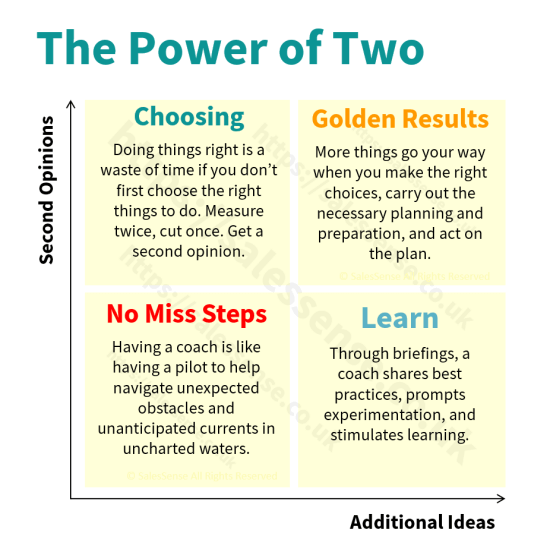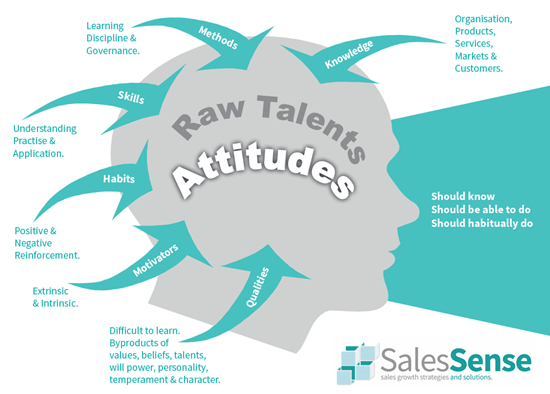The differences between training and coaching for sales performance have blurred.

Over the past decade, the landscape of training and coaching for sales has witnessed a significant transformation. This evolution has been characterized by a shift towards using virtual learning spaces for a more personalised training service.
A pivotal aspect of this transformation is the enhanced focus on coaching for sales, a method that has redefined the boundaries between traditional sales training and personalised coaching.
This shift emphasizes the importance of a tailored approach in nurturing sales talent. In this exploration, we explore how modern technologies, have reshaped sales training and coaching, and its impact on sales performance.
Why is Coaching Critical for Sales?
Perhaps the most important aspect of coaching for sales staff is motivation. It doesn't matter if the coach is labelled as such. When someone receives the right kind of individual attention, it communicates that the person is valued. Feeling motivated is at the heart of sales success. It fuels enthusiasm which in turn is contagious.
We all have strengths and weaknesses yet it can be a mistake for a coach to focus on weakness. Few enjoy paying attention to things they know they don't do well. It is much more fun to strengthen strengths. A coach can help salespeople strengthen their strengths while compensating for weaknesses.
Coaching for performance is about helping people focus on the right things to do rather than doing the right things well. When a coach helps a salesperson pay more attention to what matters most, results improve.
Things are always changing. It's easy not to notice. Having someone draw attention to changes ensures opportunities to adapt or take advantage are not missed. A sales coach helps salespeople keep up. Best practices continually evolve. What works today may not work tomorrow. A coach shares the innovations of others and thus helps sustain peak performance across a team.
Extensive evidence indicates that salespeople with a coach sell considerably more than those without one. Our research concluded that the average improvement is 13%. So establishing a sales coaching framework is critical for maximising sales performance.
The New Paradigm of Training and Coaching for Sales
Traditionally, sales training was delivered in a one-size-fits-all format, often in classroom settings. Managers would select structured courses that addressed the desired learning.
The last decade has seen this delivery model shift towards a more personalized approach, with coaching taking a more significant role. Online meetings in a virtual classroom have made one-to-one sales training, practical. Instead of multi-day training courses, learning can be extended over time and interleaved with on-the-job application.
It has become easy to integrate training with coaching for sales performance. Salespeople can engage with their sales coach for short, focused, learning and development sessions, even on a deal-by-deal basis. The manager-coach partnership can be tightened and the net result is increased sales results, higher earnings, and lower management overheads.
The Role of the Sales Coach in Modern Sales Training
A sales trainer must substantiate the justification for changing behaviour and ensure that all participants understand what they are tasked with learning and how it should be used in the workplace. Yet once the training is concluded, the participants are largely left alone to act on their learning.
Since change is almost always more difficult than maintaining the status quo, the momentum created by sales training is often quickly dissipated and lost. The exceptions are where managers learn the same material and then fulfil the sales coach role.
To do, so managers must set aside one-to-one time with each participant to discuss the implementation of their learning. The conversation has to be about the practical application of their training in the field.
As sales managers will know, this is an additional responsibility beyond the normal management of a sales team which must first be concerned with results rather than behaviour. Very often coaching for sales staff is a duty that is pushed to the back of the 'to-do' list and consequently can be neglected.
Now that sales training can be delivered in bite-sized chunks, spread over an extended period, the sales trainer can take up some of this load. In each session, participants can be given workplace assignments relating to the application of their learning. Then in each subsequent session, trainers can spend a proportion of session time operating as a sales coach. They can ask participants to share their assignment experiences and redirect them if needed. The trainer has become a sales team coach.

While the training takes much longer, it leads to real behavioural change and increased sales results. The new paradigm of training and coaching for sales addresses the shortcomings of traditional training without increasing the costs.
The Best Coaching for Sales is Combined with Training
Now that one-to-one training has become practical, the role of the trainer must evolve to embrace the task of understanding each participant's needs and focusing training time on those parts of a curriculum that are most important for success. The trainer must be both a teacher and a coach for sales performance.
This personalised journey, supported by a trainer who is also a sales coach, ensures that each salesperson can develop their skills and strategies in alignment with their individual needs and career goals. The sales coach plays a vital role in bridging the gap between learning and its practical application, making coaching for sales an indispensable part of sales training.
Bridging the Gap with Coaching for Sales Performance
Personalised training integrated with coaching for sales performance has effectively bridged the gap between traditional sales training and coaching. This convergence has led to a more holistic approach to sales development, where training and coaching are seen as complementary components of a continuous learning journey. Sales professionals now benefit from a tailored development plan focused on skill acquisition, on-the-job application, and continuous improvement.
The Benefits of Combining Training and Sales Coaching
- Relief for managers. There are usually too many competing demands on a manager's time. Adopting long-term, short-session sales training and coaching for sales teams reduces those demands. Collaboration with the sales coach delivering the training ensures no loss of control.
- Coaching for performance in line with the aims of the training is an integral part of a one-to-one or group program and doesn't require a separate arrangement. The costs are saved as a consequence of virtual meeting delivery.
- A series of one-hour sessions spread over weeks, months, and years support and sustain sales results. There are no coordination overheads, travel costs, or days out.
Selecting a Coach for Sales
Just as having the right teacher in school makes a difference in a student's attention and learning, selecting the right sales coach is essential for success. To get the benefits described above, find a coach who is also a trainer and mentor; someone who will be respected as a guide; a coach who knows how to initiate change.
Use a process for selecting the right coach, just as you probably do to select and hire the right salespeople. Decide in advance on the experience and capabilities of your ideal candidates and then devise a plan to verify the characteristics you are selecting for.
Expertise and Experience: Look for a coach with a proven track record in sales. Experience in your specific industry can be a plus, but the ability to adapt and apply sales principles across various contexts is more important. A seasoned coach brings knowledge and wisdom gained through years of experience and practice. Most coaches have a LinkedIn profile that describes their career history and is easy to verify through enquiry.
Coaching Philosophy: Seek a coach whose philosophy matches your organisational values, culture and sales goals. The coach's approach should resonate with your team's needs. If you haven't already documented your organisation's values, culture, and sales goals, now might be a good time to do so.
Adaptability and Personalisation: The best sales coaching is tailored to the individual needs of the salespeople and the team's goals. They should be adept at identifying strengths and areas for improvement and able to offer personalised guidance.
Communication Skills: Effective communication is the cornerstone of successful coaching. A coach for sales should be able to explain how their engagement will achieve the intended objectives.
Commitment to Continuous Learning: The sales landscape is ever-evolving, with new technologies and methodologies. By asking candidates how new technologies and methods are affecting selling, you can judge how well a potential coach is staying current.
Onboarding Your Coach: Once you have selected a coach for your sales staff, you should be prepared to invest some time to ensure that he or she has a full understanding of your organisation's specific needs, culture, and sales processes. In particular, your coach needs to thoroughly understand your sales processes, from lead generation to closing deals. This is essential to ensure advice is relevant, actionable and tailored to your sales team's challenges and opportunities.
Integration with Sales Tools and Technologies: Familiarise your coach with the tools and technologies your team uses. Whether it's CRM software, communication platforms, or data analytics tools, the coach should leverage these resources to enhance coaching sessions and provide practical, tech-savvy advice.
Cultural Immersion: A sales team coach becomes more effective when they're not just an external advisor but a part of the team. Immersing them in your company culture and values helps build trust and rapport with salespeople, making the coaching process more impactful.
Setting Clear Goals and Metrics: Work with the coach to establish clear, measurable goals for the coaching program. These could range from improving conversion rates and increasing average deal size to enhancing customer relationships. Regularly review these metrics to assess progress and adjust coaching strategies as needed.
Continuous Feedback Loop: Create a feedback loop between the sales team, the coach, and management. This feedback is a vital part of continuous improvement, addressing new challenges as they arise, and ensuring the coaching remains aligned with the team's evolving needs.
In Conclusion
The integration of training and coaching for sales performance discussed in this article represents a paradigm shift in how sales organisations develop their talent. Selecting and integrating a coach for sales staff is a strategic investment that can lead to sustained improvements in sales performance, team morale, and organisational growth. By focusing on the right selection criteria and ensuring thorough preparation, companies can unlock the full potential of their sales teams.
In this era of personalised coaching and technology-driven sales strategies, the role of a coach for sales has never been more important. As we navigate the complexities of modern sales environments, the insights and guidance provided by a well-selected and properly integrated coach can be the catalyst for achieving unprecedented sales success.
Article by Clive Miller
Schedule a call with me.
See our one-to-one and group courses here.
If you need to increase sales performance for yourself or a team and would like to explore the use of training with coaching for sales built-in, get in touch. Telephone +44 (0)1392 851500. We will be pleased to discuss your needs or talk through some options. Alternatively, email custserv@salessense.co.uk or use the contact form here.













